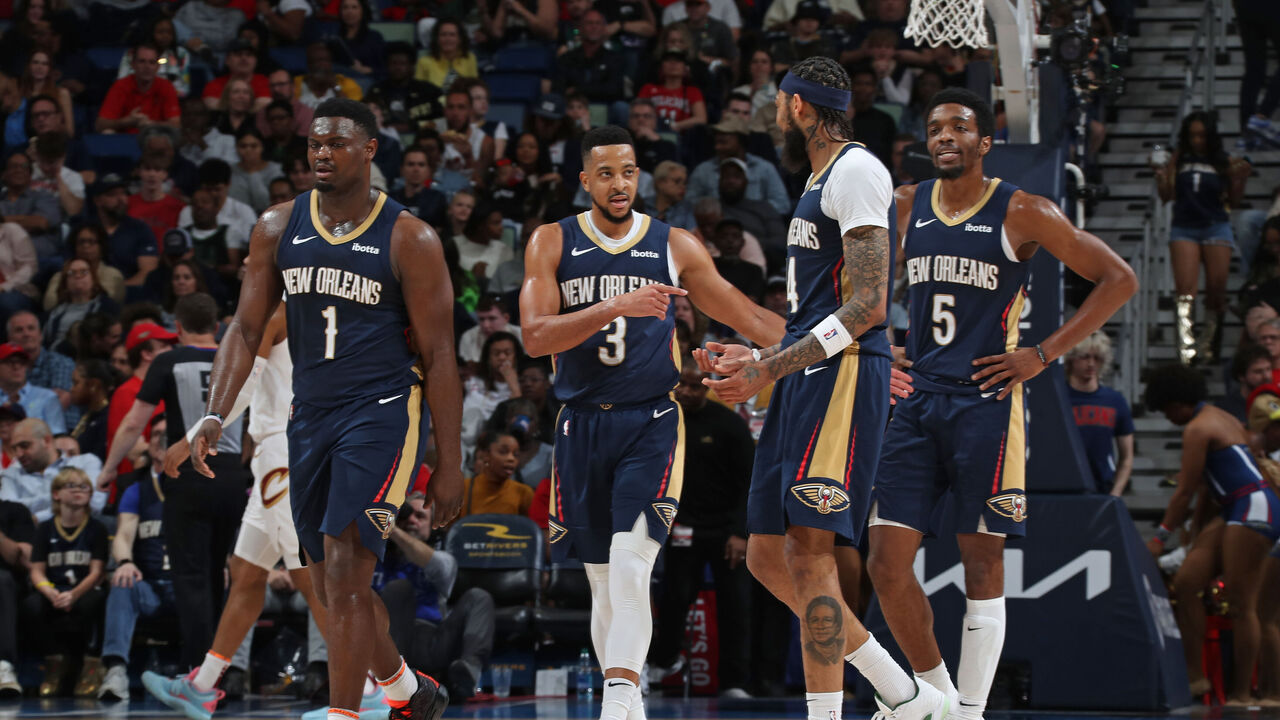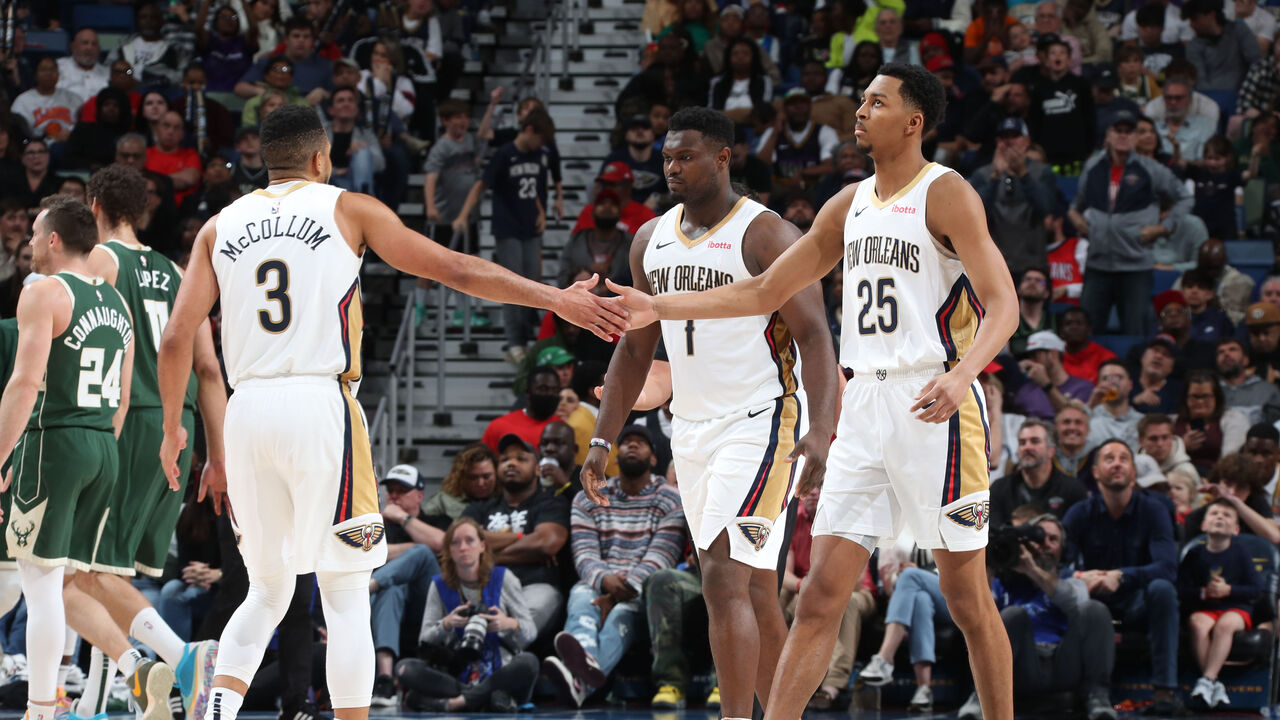Raw ability has never truly been an issue for the Zion Williamson-era New Orleans Pelicans. This is a talented team with a ton of potential that feels perpetually on the verge of breaking out. It’s the spotty availability of their best players, along with the tenuous on-court fit between those players when healthy, that always manages to derail them.
On the health front, there doesn’t appear to be a solution for New Orleans other than hoping and praying Williamson’s frequently airborne 285-pound frame holds together. As for the fit issue, the front office tried to address it this offseason by letting space-occupying center Jonas Valanciunas walk, trading for Dejounte Murray, and dangling Brandon Ingram, whose partnership with Williamson has always amounted to less than the sum of its parts due to his limitations as an off-ball player and defender.
The problem is that no Ingram trade ever materialized; adding Murray merely throws another touch-needy player into the mix; and no suitable replacement for Valanciunas (nor Larry Nance, moved in the Murray deal) was found. So now the Pelicans are looking at opening the season with a disgruntled second star, possibly too many mouths to feed on offense, and zero legitimate big-minute centers on the roster. Their depth chart at that position consists of 20-year-old rookie Yves Missi and undersized pseudo-stretch-big Daniel Theis, who signed for the minimum after playing third string for the Clippers last season.
Were there not six other players who deserve and can reasonably expect to start for New Orleans, Theis may have been in line to take some token tipoffs. As things stand – with Williamson, Ingram, Murray, CJ McCollum, Herb Jones, and Trey Murphy III fighting for five starting/closing spots – it seems inevitable that the Pelicans’ primary lineups will feature 6-6 Williamson as the de facto five. He isn’t the tallest player among that group (Ingram, Jones, and Murphy are all 6-8), but his heft makes him the best candidate to guard opposing centers and serve as the principal ball-screener in those lineups. Which is interesting, because he’s also probably the best point guard on the team.
The league broadly is moving away from center-less lineups, but there are still scenarios in which they can succeed. So, how will that work for New Orleans in what should be by far the largest such sample of Williamson’s career? Is exposing his precarious body to the rigors of the five the best idea? Can the team’s offense be good enough to offset its flimsy interior defense and rebounding? These are the questions that will define the Pelicans’ season, and/or determine how aggressively they’re forced to pursue an alternate path.

One key feature of most successful small-ball lineups is that they aren’t actually small anywhere except the five. That’s roughly true of these Pelicans, who’ll have solid positional size one through four, especially in lineup iterations that include only one of Murray or McCollum. Jones, an All-Defensive first teamer last season, is one of the league’s better paint-protecting wings, which can help cover for the fact Williamson – despite evolving into a good low-man helper – hasn’t shown the ability to play drop coverage or anchor a back line. That said, considering the importance of Murphy’s shooting and the pedigree of the other four core guys, Jones may not even start.
New Orleans managed to post a 96th-percentile defensive rating in slightly more than 300 minutes with Williamson at center last season, per Cleaning the Glass, but that was mainly because opponents hit just 32% of their threes (including 28% from the corners) and 35% of their mid-range jumpers. Favorable opponent shooting luck obscured the extent to which the Pelicans got obliterated at the rim and on the glass in those minutes. They allowed opponents to take 37% of their shots from inside the restricted area, shoot 69% on those short-range looks, and rebound 33% of their own misses.
None of the Pelicans’ forward-sized players are particularly good rebounders, which is the area they’ll likely miss Valanciunas the most. Despite the success they had downsizing in a small sample last season, it never felt like a viable option for extended stretches, at least not against serious competition. And yet, here we are, with it looking like the only option for them to start and close games.
The big benefit will be their ability to maximize spacing around Williamson. In that sense, one could argue playing him at the five actually eases the physical burden on him, since he doesn’t have to collide with as many bodies on his countless forays to the rim.
One of the Pelicans’ biggest issues during Williamson’s tenure has been 3-point shooting, especially in terms of volume. They actually morphed into one of the most accurate teams from long range in 2023-24, but remained bottom 10 in 3-point attempt rate. The small-ball version of this team should be able to marry that improved efficiency with an uptick in attempts.
McCollum and Murphy combined to shoot 40.7% on 16.2 threes per game last year, with Murphy creating additional space thanks to range that stretches to 30 feet. Murray’s been steadily improving from outside, and last season showed he was capable of sustaining a respectable clip (36.3%) on increased volume (a career-high 7.1 attempts). Only about half of those came off the catch – where he shot 39.2% – and New Orleans should try to nudge him further in that direction. Same goes for Ingram, who’s hit 37% of his threes as a Pelican and simply needs to take more of them. Jones made a massive leap as a shooter, canning 41.8% of his 3.6 tries.

To get the most offensively out of this group, the Pelicans need to engender the kind of buy-in from their complementary players that they got from McCollum last season – a willingness to play off of Williamson and capitalize on the advantages he creates. Neither Ingram nor Murray will ever have McCollum’s off-ball gravity, and they’ll still get plenty of opportunities to handle the rock, but they can still stand to be way more active when it’s out of their hands. The offense has long functioned best with Williamson as a defense-bending primary creator. Murray’s ultimate sacrifice would be accepting a move to the bench, which would be a difficult but sensible choice for coach Willie Green given the less duplicative skills Jones and Murphy offer the starting group.
This team still lacks an elite playmaker, but now boasts a quartet of above-average ones. Besides, good spacing has a way of mitigating playmaking deficiencies – just ask last year’s Celtics. These Pelicans obviously won’t stretch defenses out to nearly the same extent as the defending champs did, but Williamson’s on-ball magnetism means they may not have to. The amount of defensive help required to slow his downhill momentum opens up easier shots and reads for every link in the chain.
There’s a path for the Pelicans to be a top-five offense, and they have to hope they can at least get close to that benchmark. They overperformed by finishing sixth on defense last year, and were due to regress even before they lost important pieces of that unit in Nance, Dyson Daniels, and Naji Marshall. The fact they’re so vulnerable inside (they finished 27th in field-goal percentage allowed at the rim, then got considerably smaller) puts a ton of pressure on their perimeter defenders to keep the ball away from that mushy middle.
Jones is clearly up to the task, not just as a one-on-one stopper but as a nail helper capable of vaporizing drives before they begin. Jose Alvarado is going to fight through screens and pester the hell out of opposing point guards. Javonte Green should be able to replicate some of what Marshall provided. But those guys may all be reserves, and everyone else is a question mark. Are Ingram and Murphy too slight to be quality wing defenders? Is there a ball-screen coverage that works for Williamson? Can Murray get back to enveloping ball-handlers after a Hawks tenure that saw him lose his bite at the point of attack?
It’s not unusual for the Pelicans to lead the league in questions, but this is something new. Zion’s point-center era is about to begin. Let’s see how long it lasts.






